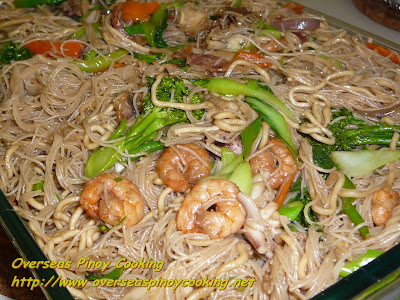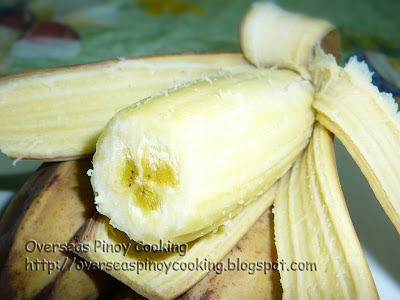Seafood Mixed Pansit Guisado, Seafood Mixed Noodle Stirfry
Seafood Mixed Pansit Guisado, Seafood Mixed Noodle Stirfry. It’s been some time when I last posted a Pinoy noodle or pansit dish. The truth is there are already quite a number of pansit recipes in the archives.
To the more experience cooked out there the Pinoy pansit guisado cooking procedure would consider it fairly easy, cooking method would be similar whatever type of noodles and ingredients are used. It’s basically involved stirfrying the main ingredients this would be a combination of meat, seafood and vegetables, and of course the noodles used. However for the benefit of those who are still learning to cook. Let me again share the recipe of cooking Pansit guisado.
This time I opted to used frozen mixed seafood or marinara mix as the main sahog or ingredients. I did not use pork or chicken which are usually used in cooking pansit. I just used a piece of Chinese sausage for added oriental flavor. For the vegetables the choice is yours, any suitable vegetables will do, I just enumerated the vegetables that I used, and here is the recipe of my Seafood Mixed Pansit Guisado, Seafood Mixed Noodle Stirfry.
Ingredients:
1 kilo bihon noodles, pre-soaked with water
1/2 kilo canton noodles
300-400 grams mixed seafood or marinara mix
1 small Chinese sausage, cut into thin slices
1 medium size carrot, cut into thin slices
1 bunch bok choy, trimmed, cut into pieces
1 bunch baby broccoli, trimmed, cut into pieces, stem thinly sliced
2-3 stalk celery, sliced thinly
1 small bunch spring onion, chopped
1/3 cup patis, fish sauce
1/2 cup soy sauce
1/2 head garlic, chopped
1 medium size onion, chopped
salt and pepper
cooking oil
Cooking procedure:
In a large wok, sauté garlic and onion in a generous amount of cooking oil until fragrant. Add the Chinese sausage and continue to stir for 2 to 3 minutes. Add in the seafood and stir cook for another 2 to 3 minutes. Scope out the seafood ingredients and keep aside. Add in the fish sauce, soy sauce, some powdered pepper and add 6 to 8 cups water or vegetable/seafood stock let boil. Add in the canton noodles, stir cook for 2 to 3 minutes, then add in the bihon noodles and continue to stir cook for 5 to 8 minutes. Now add in the cooked mixed seafood and vegetables, continue to stir cook for another 8 to 10 minutes or until vegetables are just cooked and until the noodles have absorbed most of the broth, add more stock if necessary. Correct saltiness if required. Garnish with chopped spring onion and serve with kalamansi or lemon.
See related Pansit Noodle Recipes;
Vegetarian Mixed Pansit Guisado. Stirfried Vegtable Noodles
Pancit Canton and Bihon with Beef and Broccoli
Bam-e, Pansit Bisaya
Pansit Guisado (Bihon, Canton and Mixed)
Pancit Molo
Pinoy Style Pad Thai
Pansit Palabok, Rice Noodles with Seafood
Pansit Palabok, Pansit Luglug
Garlic Sotanghon
Pansit Sotanghon with Roast Chicken Breast
Ginisang Sotanghon with Sardinas
Salmon with Sotanghon Noodle Soup
Tinolang Manok with Malungay and Sotanghon
Mushroom Sotanghon Noodle Soup
Crab with Sotanghon in Black Bean Sauce
Dried Fish and Sotanghon with Coconut Milk
Pansit Sotanghon With Togue Guisado
To the more experience cooked out there the Pinoy pansit guisado cooking procedure would consider it fairly easy, cooking method would be similar whatever type of noodles and ingredients are used. It’s basically involved stirfrying the main ingredients this would be a combination of meat, seafood and vegetables, and of course the noodles used. However for the benefit of those who are still learning to cook. Let me again share the recipe of cooking Pansit guisado.
This time I opted to used frozen mixed seafood or marinara mix as the main sahog or ingredients. I did not use pork or chicken which are usually used in cooking pansit. I just used a piece of Chinese sausage for added oriental flavor. For the vegetables the choice is yours, any suitable vegetables will do, I just enumerated the vegetables that I used, and here is the recipe of my Seafood Mixed Pansit Guisado, Seafood Mixed Noodle Stirfry.
Ingredients:
1 kilo bihon noodles, pre-soaked with water
1/2 kilo canton noodles
300-400 grams mixed seafood or marinara mix
1 small Chinese sausage, cut into thin slices
1 medium size carrot, cut into thin slices
1 bunch bok choy, trimmed, cut into pieces
1 bunch baby broccoli, trimmed, cut into pieces, stem thinly sliced
2-3 stalk celery, sliced thinly
1 small bunch spring onion, chopped
1/3 cup patis, fish sauce
1/2 cup soy sauce
1/2 head garlic, chopped
1 medium size onion, chopped
salt and pepper
cooking oil
Cooking procedure:
In a large wok, sauté garlic and onion in a generous amount of cooking oil until fragrant. Add the Chinese sausage and continue to stir for 2 to 3 minutes. Add in the seafood and stir cook for another 2 to 3 minutes. Scope out the seafood ingredients and keep aside. Add in the fish sauce, soy sauce, some powdered pepper and add 6 to 8 cups water or vegetable/seafood stock let boil. Add in the canton noodles, stir cook for 2 to 3 minutes, then add in the bihon noodles and continue to stir cook for 5 to 8 minutes. Now add in the cooked mixed seafood and vegetables, continue to stir cook for another 8 to 10 minutes or until vegetables are just cooked and until the noodles have absorbed most of the broth, add more stock if necessary. Correct saltiness if required. Garnish with chopped spring onion and serve with kalamansi or lemon.
See related Pansit Noodle Recipes;
Vegetarian Mixed Pansit Guisado. Stirfried Vegtable Noodles
Pancit Canton and Bihon with Beef and Broccoli
Bam-e, Pansit Bisaya
Pansit Guisado (Bihon, Canton and Mixed)
Pancit Molo
Pinoy Style Pad Thai
Pansit Palabok, Rice Noodles with Seafood
Pansit Palabok, Pansit Luglug
Garlic Sotanghon
Pansit Sotanghon with Roast Chicken Breast
Ginisang Sotanghon with Sardinas
Salmon with Sotanghon Noodle Soup
Tinolang Manok with Malungay and Sotanghon
Mushroom Sotanghon Noodle Soup
Crab with Sotanghon in Black Bean Sauce
Dried Fish and Sotanghon with Coconut Milk
Pansit Sotanghon With Togue Guisado







wow ang sarap nito... pinoy na pinoy!
ReplyDelete